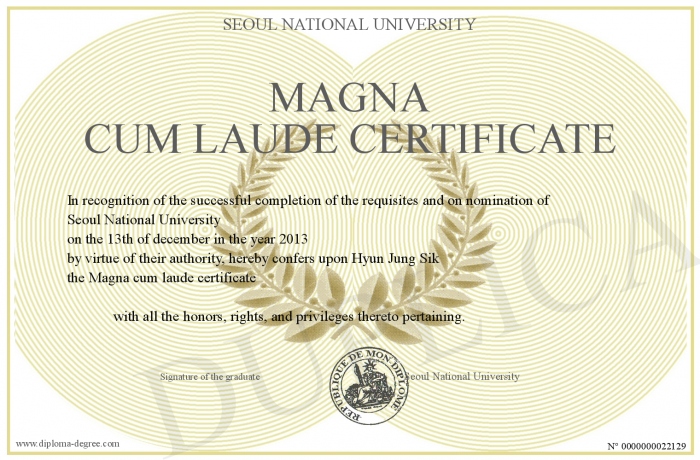
Magna cum laude definition, with great praise: used in diplomas to grant the next-to-highest of three special honors for grades above the average. See more.

Learn about the honor of achieving the Cum Laude title and difference between summa and magna cum laude.
She worked incredibly hard throughout her time at college, eventually graduating magna cum laude, the second highest distinction a student can get.

Cum laude [1] (en latín, ‘con alabanza, con elogio’) es una locución latina usada para indicar el nivel de rendimiento académico con el que se ha obtenido un grado académico universitario máximo, usualmente el doctorado.


Magna cum laude è un’espressione latina, dal significato letterale con grande lode.Espressioni come cum Laude, Magna cum Laude, Summa cum Laude, Maxima cum Laude, consistono in una vera e propria valutazione, assegnata in relazione all’intervallo di punteggio in cui ricade la media conseguita dal laureato nel suo iter …
Cum laude is a phrase used mainly in the United States, though it is found in other countries as well. It is Latin and literally means with praise. It is used by universities and colleges to set some graduates apart as having honors. Magna cum laude is the next level up, meaning something like

Cum Laude, Magna, Summa, Honor Role, Graduating With Honors, Mean, Definition, Requirements, GPA, Convocation, College, High college, Initiation, Ceremonies, Induction



Mack graduated magna cum laude with honors in history from Columbia University. — Fox News, “Ivy League educated dancer to head Juilliard division,” 11 Apr. 2018
Magna cum laude is a term used by educational institutions to signify an academic degree that was earned “with great honor.”
Az együttes. A Magna Cum Laude zenekar 1999 nyarán Mezőtúron alakult gyulai zeneszerető barátokból. Egy hónapon át tartó huzamosabb próbaidőszakot követően a zenekar egy országos tehetségkutatón mérette meg magát.